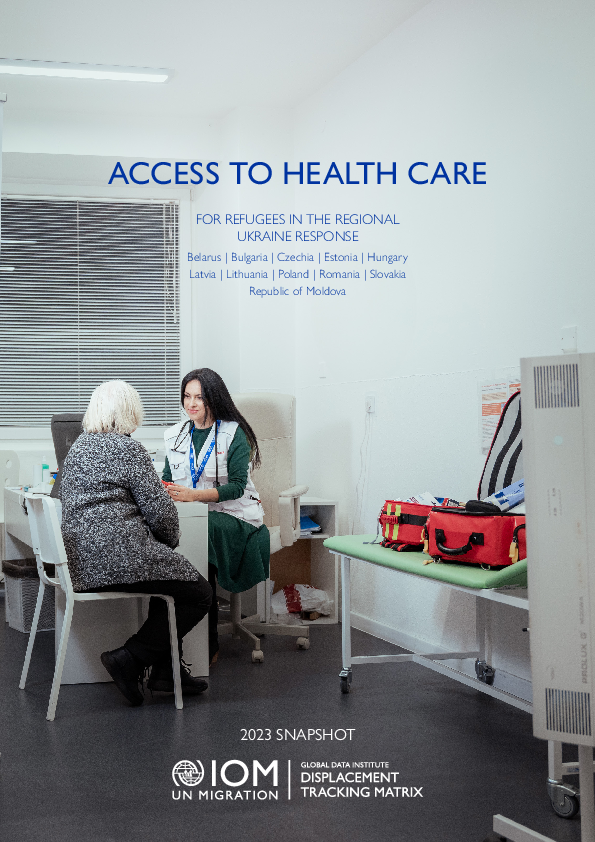-
Countries
-
Data and Analysis
-
Special Focus
-
Crisis Responses
Assessment Report

Contact
DTMUkraine@iom.int
Language
English
Location
Ukraine
Period Covered
Mar 10 2024
Apr 11 2024
Activity
- Survey
Between 10 March and 11 April 2024, the International Organization for Migration (IOM) conducted Round 16 of the General Population Survey (GPS), a highly representative assessment of internal displacement in Ukraine. The data presented in this report was commissioned by the International Organization for Migration (IOM) and collected by 59 enumerators employed by Multicultural Insights through screener phone-based interviews with 20,000 randomly selected respondents and follow-up interviews with 1,428 IDPs, 1,639 returnees, and 2,266 residents, using the computer-assisted telephone interview (CATI) method, and a random digit dial (RDD) approach.
This report provides the main findings from Round 16 of the GPS, including detailed insights into population figures, mobility intentions, demographic profiles, household composition and vulnerabilities, and needs of the returnee population, to facilitate evidence-based decision-making on strategic, technical, and programmatic aspects of the response and recovery efforts in Ukraine.
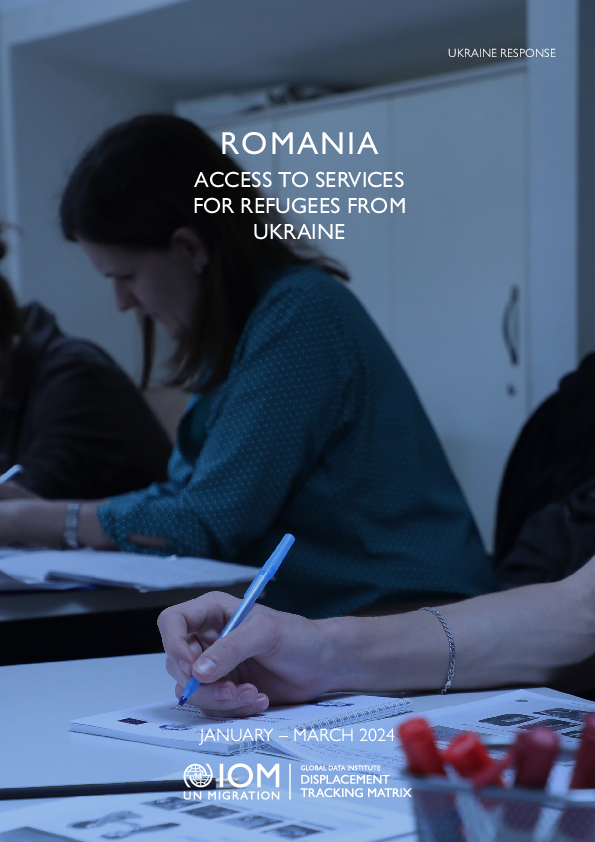
Contact
DTM Europe, DTMMediterranean@iom.int
Language
English
Location
Romania
Period Covered
Jan 01 2024
Mar 31 2024
Activity
- Survey
- Flow Monitoring
IOM’s Displacement Tracking Matrix (DTM) collected data on the needs, intentions, and integration challenges of refugees as part of the Surveys with Refugees in the Ukraine Response Region exercise. From January to March 2024 (Q1), DTM interviewed a total of 437 individuals in Romania, all of whom were Ukrainian except one. This report presents the findings of surveys with 436 adult Ukrainian nationals, including access to services that facilitate integration, and need and assistance.
Key findings:
- Migration status
- 93% EU Temporary protection status
- 7% Other Active population:
- Household (HH) composition
- At least 2 adults and 1 child – 38%
- A single adult and at least 1 child – 21%
- Alone – 21%
- At least two adults and no children – 19%
- Other – 1%
- Children
- 65% - HH with children
- 68 % - children aged between 5 and 17 years old
- 32% - infants aged between 0 and 4 years old
- Needs
- Financial support (73%)
- Sanitary products (56%)
- Food supply (53%)
- Health services (53%)
- Employment (31%)
- Obstacles in accessing healthcare
- Language barrier 43%
- None 38%
- Cost 29%
- Long queues 17%
- Unavailable Services 8%
- Ease of visiting a doctor
- Very difficult 8%
- Somewhat difficult 31%
- Neither easy, nor difficult 30%
- Somewhat easy 13%
- Very easy 1%
- Unknown 17%
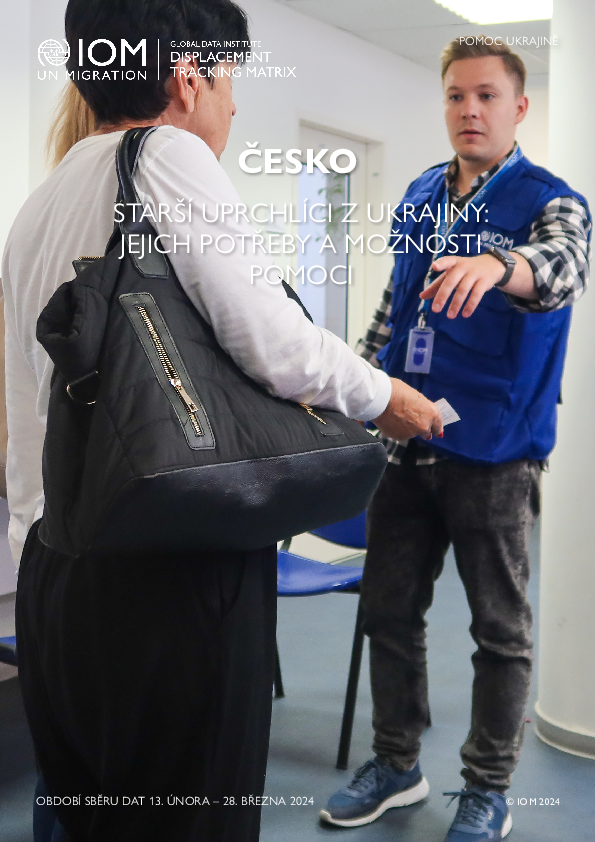
Contact
DTM Europe, DTMMediterranean@iom.int
Language
Czech
Location
Czechia
Period Covered
Feb 13 2024
Mar 28 2024
Activity
- Survey
- Flow Monitoring
K 1. dubnu 2024 bylo v Česku podle vnitrostátních orgánů registrováno 338 736 uprchlíků z Ukrajiny, kteří žádali o dočasnou ochranu. Tato zpráva vychází ze smíšeného výzkumu se staršími uprchlíky, skupinou, která byla v předchozích výzkumech, označena za jednu z nejzranitelnějších. Ukazuje, že ekonomická soběstačnost a jazyková adaptace mohou být pro tyto osoby problematické. V důsledku toho jsou často závislí na vnější podpoře, kterou jim ve většině případů poskytují jejich rodinní příslušníci. Mnozí z nich, bez ohledu na svůj věk, chtějí pracovat a nebýt pro svou rodinu nebo společnost přítěží. To však může být náročné a pouze 12 % z nich má práci. Ti, kteří nepracují, často pečují o děti nebo postižené členy rodiny nebo se snaží být užiteční jiným způsobem. Tento způsob přínosu je potřeba uznat.
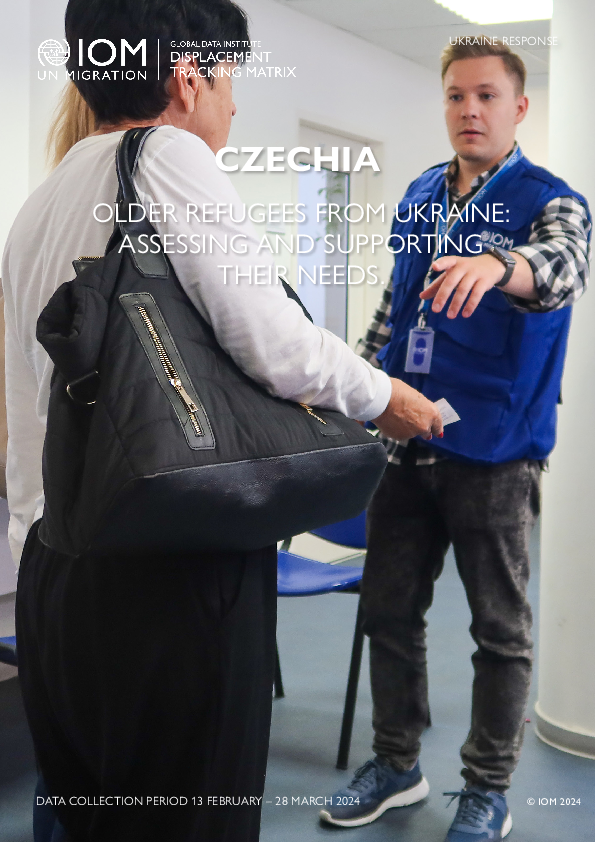
Contact
DTM Europe, DTMMediterranean@iom.int
Language
English
Location
Czechia
Period Covered
Feb 13 2024
Mar 28 2024
Activity
- Survey
- Flow Monitoring
This report is based on a mixed method study conducted among older refugees, a group that has been identified by previous research, including that of IOM, as being among the most vulnerable. It shows that economic self-reliance and language adaptation can be problematic for these individuals. Consequently, they often depend on external support, which in most cases, is provided by their family members. Many of them, regardless of their age, want to work, and not to be a burden to their families or society.
Data collection took place between the dates of 13 February and 28 March 2024, resulting in 403 interviews with refugees from Ukraine. In 128 cases, additional information was collected during the qualitative interview phase.
Key Findings
- 77% of respondents had serious health specific needs
- 73% were registered with a general health practitioner
- Only 12% were employed, where 29% were working without a written contract
- 50% of employed respondents were working 160 hours or more per month
- One-third of respondents could speak Czech (35% of women, 30% of men)
- Over half the respondents couldn’t afford 2,500 CZK as an unexpected expense
- Two-thirds of respondents have a monthly household income of less than 12,500 CZK
- 82% of respondents reported at least one priority need
From January to December 2023, IOM’s Displacement Tracking Matrix (DTM) collected data on the Needs, Intentions, and Integration Challenges of refugees from Ukraine and Third-Country Nationals (TCNs) in 11 countries in the Ukraine Response: Belarus, Bulgaria, Czechia, Estonia, Hungary, Latvia, Lithuania, Poland, Republic of Moldova, Romania, and Slovakia. Over the course of 2023, a sample of a total of 28,712 respondents were surveyed on displacement patterns and experiences, including access and barriers to health care.
Key Findings
- One-third (34%) of respondents stayed with at least one person (including themselves) with a chronic condition.
- 16% of respondents had or accompanied someone with at least one disability in 2023.
- Across all 11 countries, 54% of the people interviewed faced one or more challenges to accessing health care.
- Top barriers included long waiting times (30%) and the language barrier (23%).
- Top health needs reported were health-care services (41%), medicines (29%) and psychological counselling (5%).
- 37% of households needed to pay for both health-care services and medicine.
- 42% of respondents needed more information on health-care services, 17% on psychological counselling and 12% on medicine.
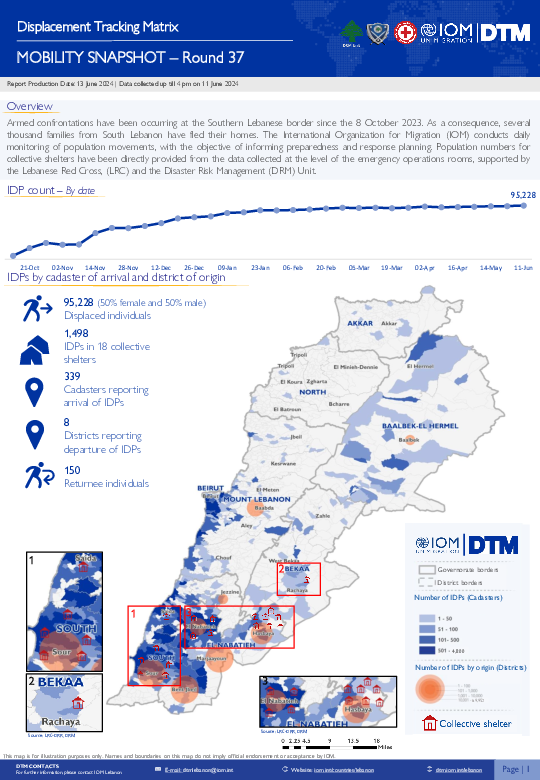
Contact
dtmlebanon@iom.int
Language
English
Location
Lebanon
Period Covered
Oct 10 2023
Jun 11 2024
Activity
- Mobility Tracking
- Baseline Assessment
Since October 8 there has been an increase in cross-border incidents between Israel and Lebanon, resulting in the displacement of people both within the South and elsewhere within the country. Since October 10, the Displacement Tracking Matrix (DTM) has been conducting the daily monitoring of population movements. The objective of the exercise is to inform preparedness and response planning.

Contact
DTM Ethiopia, DTMEthiopia@iom.int
Language
English
Location
Ethiopia
Period Covered
Jul 01 2019
Jan 08 2023
Activity
- Mobility Tracking
- Site Assessment
- Village Assessment
The objective of this thematic report is to provide an overview of the International Organization for Migration (IOM)'s Data and Research Unit (DRU) data collected through its Displacement Tracking Matrix (DTM) methodology and Site Assessment (SA) and Village Assessment Survey (VAS) tools deployed at the location level in Ethiopia between July 2019 and January 2023. Through the SA, sites hosting at least 20 IDP households are assessed and, through the VAS, villages hosting at least 20 returning IDP households are assessed.
This overview gathers and analyzes specific data records on displacement and returns related to drought and other climate-induced factors such as floods, landslides and fires.

Contact
DTM Europe, DTMMediterranean@iom.int
Language
English
Location
Republic of Moldova
Period Covered
Jan 01 2024
Mar 31 2024
Activity
- Survey
- Flow Monitoring
The IOM’s Displacement Tracking Matrix collected data through Surveys with refugees in the Ukraine Response region from January to March 2024. In the Republic of Moldova, a total of 1,507 surveys were collected. This report focuses on the characteristics, socio-demographic composition, challenges, and needs of the displaced population in the Republic of Moldova, with a particular emphasis on healthcare and the medical needs of the respondents.
Key findings:
- 39% of respondents have or live with people with specific needs or serious medical conditions, while 2% reported living with a pregnant or lactating women.
- Main health issues for women include chronic disease or serious medical conditions (25%), difficulty walking (5%), visual impairment (3%), and hearing impairment (3%).
- Main health issues for men include chronic disease or serious medical conditions (48%), difficulty walking (5%), visual impairment (5%) and hearing impairment (2%).
- Health related needs reported by the respondents include medication (43%), health services (36%), and mental and psychosocial support (2%).
- The most reported barriers to accessing health care were costs (59%), long queues (35%), language barrier (19%), unavailable services (18%), and lack of documents (17%).

Contact
DTM Europe, DTMMediterranean@iom.int
Language
English
Location
Republic of Moldova
Period Covered
Jan 01 2024
Mar 31 2024
Activity
- Survey
- Return Intention
- Flow Monitoring
IOM’s Displacement Tracking Matrix (DTM) collects data on Ukrainian nationals and Third-Country Nationals (TCNs) that were crossing back to Ukraine from or through the Republic of Moldova, either for temporary stay or prospective return. The survey focuses on the return intentions, duration of displacement, destinations, assistance, and experiences of unequal treatment of the respondents. A total of 1,800 surveys were collected between January and March 2024.
Key findings:
- 87% of Ukrainian respondents planned to go for a short visit, 7% intended to stay in Ukraine (prospective returnees), while 6% were not sure about their intentions.
- The majority (69%) been residing in the Republic of Moldova, 9% in Romania, 5% in Germany. The remaining 17% stayed in other countries.
- 83% were going back to their Oblast of origin, while 17% were going back to a different Oblast.
- 43% had been displaced between January and June 2022.
- 67% crossed back to Ukraine twice or more since 2022. 10% crossed more than 10 times.
- 79% of prospective returnees and 91% of short-term visitors reported having received assistance since their displacement.
- Main priority needs that were cited by respondents include financial support (43%), medicine and health services (27%) and personal safety and security (22%).
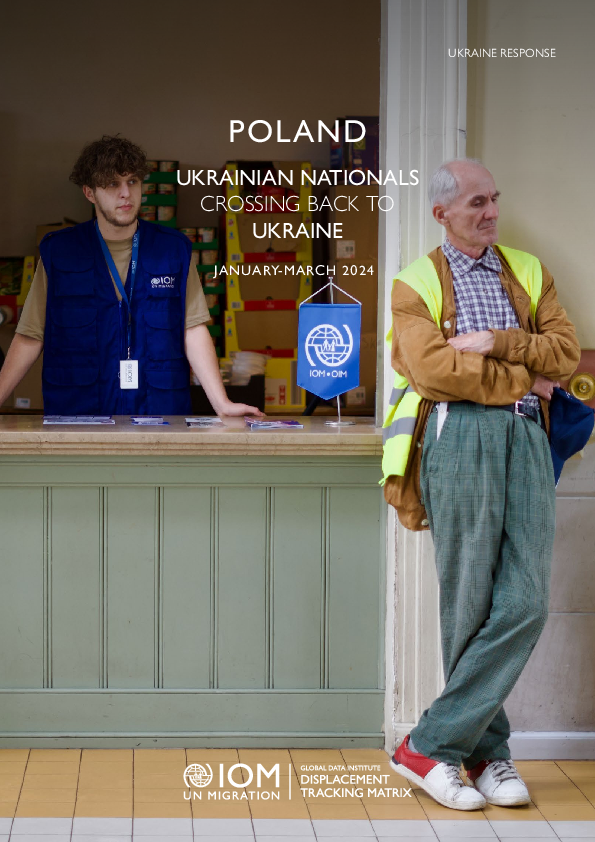
Contact
DTM Europe, DTMMediterranean@iom.int
Language
English
Location
Poland
Period Covered
Jan 01 2024
Mar 31 2024
Activity
- Survey
- Return Intention
- Flow Monitoring
IOM’s Displacement Tracking Matrix (DTM) collected data on Ukrainian nationals and Third-Country Nationals (TCNs) who crossed back to Ukraine from Poland, either for a temporary stay or permanent return after a period of displacement abroad. The survey focuses on the return intentions, duration of displacement, destinations, assistance, and experiences of discrimination of 361 Ukrainian respondents surveyed between January and March 2024.
Pagination
- Previous page
- Page 27
- Next page
